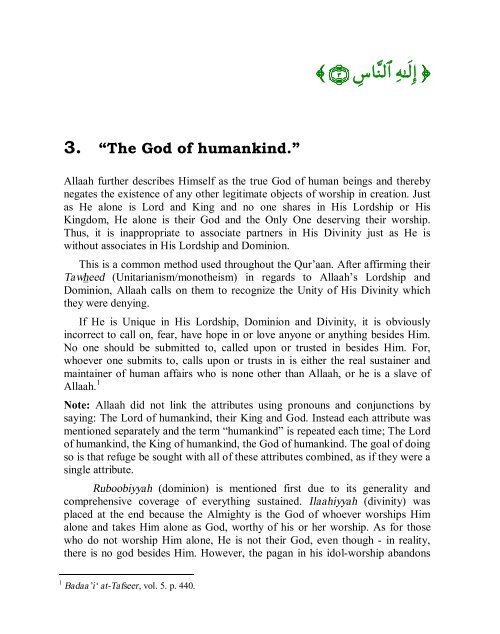You also want an ePaper? Increase the reach of your titles
YUMPU automatically turns print PDFs into web optimized ePapers that Google loves.
á ÇÌÈ Ä¨$Ÿ9$#<br />
Ïm»s9Î) â<br />
3. “The God of humankind.”<br />
Allaah further describes Himself as the true God of human beings and there<strong>by</strong><br />
negates the existence of any other legitimate objects of worship in creation. Just<br />
as He alone is Lord and King and no one shares in His Lordship or His<br />
Kingdom, He alone is their God and the Only One deserving their worship.<br />
Thus, it is inappropriate to associate partners in His Divinity just as He is<br />
without associates in His Lordship and Dominion.<br />
This is a common method used throughout the Qur’aan. After affirming their<br />
Tawheed (Unitarianism/monotheism) in regards to Allaah’s Lordship and<br />
Dominion, Allaah calls on them to recognize the Unity of His Divinity which<br />
they were denying.<br />
If He is Unique in His Lordship, Dominion and Divinity, it is obviously<br />
incorrect to call on, fear, have hope in or love anyone or anything besides Him.<br />
No one should be submitted to, called upon or trusted in besides Him. For,<br />
whoever one submits to, calls upon or trusts in is either the real sustainer and<br />
maintainer of human affairs who is none other than Allaah, or he is a slave of<br />
Allaah. 1<br />
Note: Allaah did not link the attributes using pronouns and conjunctions <strong>by</strong><br />
saying: The Lord of humankind, their King and God. Instead each attribute was<br />
mentioned separately and the term “humankind” is repeated each time; The Lord<br />
of humankind, the King of humankind, the God of humankind. The goal of doing<br />
so is that refuge be sought with all of these attributes combined, as if they were a<br />
single attribute.<br />
Ruboobiyyah (dominion) is mentioned first due to its generality and<br />
comprehensive coverage of everything sustained. Ilaahiyyah (divinity) was<br />
placed at the end because the Almighty is the God of whoever worships Him<br />
alone and takes Him alone as God, worthy of his or her worship. As for those<br />
who do not worship Him alone, He is not their God, even though - in reality,<br />
there is no god besides Him. However, the pagan in his idol-worship abandons<br />
1 Badaa’i‘ at-<strong>Tafseer</strong>, vol. 5. p. 440.














